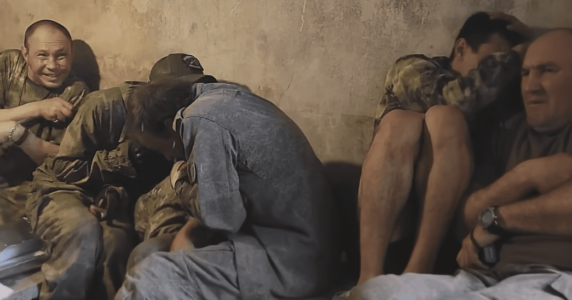Navigation and useful materials
The full-scale invasion of Ukraine began with the accompaniment of harsh and uncompromising rhetoric from Moscow. Timofey Sergeitsev’s article “What Russia should do with Ukraine”, published on the website of the Russian state agency “RIA Novosti” on April 3, 2022, well reflects the mood in the Kremlin at the time. “The terms of denazification cannot be less than one generation,” Sergeitsev wrote, emphasising the need for “ideological repression” against “a significant part of the population” and considering whether it is appropriate to keep the name “Ukraine” for the occupied territory. It appears that Moscow really believed in the possibility of a “blitzkrieg” and was already making plans for the recolonization of Ukraine. During meetings with Ukrainian delegations in February, March, and April 2022, particularly in Istanbul, Russia hoped that Kyiv, shocked by the scale of the war, would agree to all Russian ultimatums and capitulate, if not de jure, then de facto. But this did not happen.
Moscow was talking about its readiness for peace negotiations again in the fall of 2022. However, this rhetoric was misleading. At that moment, the aggressor’s army lost its strategic initiative, was knocked out of the Kyiv, Chernihiv, and Sumy regions, and later from the Kharkiv region and the right bank of the Kherson region. To prevent the collapse of its own armed forces, Moscow was forced to announce a partial mobilisation and throw thousands of prisoners enrolled in the PMC Wagner into “meat assaults”. The start of negotiations would allow the occupiers to take an operational pause, which the Russian generals really needed. However, Moscow did not receive such a gift. In addition, in October 2022, Volodymyr Zelenskyy implemented the decision of the National Security Council, which recorded the impossibility of negotiations with Putin.
During 2023, Putin returned to the topic of negotiations several times, and in 2024, assurances of his readiness for a diplomatic settlement became a constant refrain in the Kremlin’s official rhetoric. However, in terms of their content, these were more like ultimatums than a real invitation to dialogue. For example, on May 30, 2024, Russian Foreign Minister Serhey Lavrov stated that it is possible to “accelerate the settlement” in the case of “ceasing the supply of Western weapons and ending hostilities by Kyiv.” It was clear that fulfilling these requirements would be suicidal for Ukraine. Putin voiced equally unacceptable demands on June 14, 2024: he said that to start negotiations, Ukraine must, among other things, withdraw troops from the territory of the Luhansk, Donetsk, Kherson, and Zaporizhzhia regions. The fact that Kyiv will not agree to such “generous offers” is well understood in Moscow. However, there is every reason to believe that, at this stage, the rhetoric of the Kremlin performs completely different functions that have nothing to do with the search for ways to peace.
Manipulation of international opinion
Firstly, the Kremlin’s statements about readiness for negotiations are part of a Russian propaganda campaign aimed at destroying the international community consensus regarding support for Ukraine. Attempts to convince the world that Putin’s “SVO” was a response to Kyiv’s aggressive intentions turned out to be pathetic, and Russian fakes about “biolaboratories” in which Ukrainians allegedly prepared weapons of mass destruction and similar nonsense became the subject of ridicule. Russia was unequivocally recognized as the aggressor and Ukraine as the victim of an unprovoked attack. Now, the Kremlin has resorted to another attempt to manipulate international opinion. Its primary task is to convince the world that Moscow has long been calling for a peaceful settlement, while Kyiv stubbornly rejects the path of diplomacy and seeks continued bloodshed, exposing Western countries to the threat of uncontrolled escalation and forcing them to finance their own “militarism.”
In Europe, invaluable support for Putin, in this campaign, is provided by Viktor Orbán, who in July 2024 carried out a “peacemaking mission”, visiting Kyiv and Moscow, after which he sent his own “peace plan” to the leaders of the European Council. According to Radio Svoboda, which has read the non-public document, Orbán relays Moscow’s position. It is obvious that such actions by the Hungarian leader help Putin promote his position on the European agenda. The same is happening in the United States, where Donald Trump’s ambivalent rhetoric sometimes openly resonates with Russian narratives. Apparently, Moscow hopes that the Western consensus will, sooner or later, fall apart, and Kyiv will have no choice but to accept Putin’s ultimatums.
However, the deceptiveness of Russian rhetoric is perfectly understood in the West. For example, on June 24, 2024, German Chancellor Olaf Scholz, commenting on Moscow’s “peace plan”, stated that “Putin is still fully committed to war and rearmament; no one can ignore this,” and that the main task at the moment is to prove to Putin that he cannot conquer Ukraine on the battlefield. This statement reflects the consensus of the West regarding the prospects of the Russian-Ukrainian war. There is no reason to accuse Ukraine of excessive ambitions because it was Kyiv that initiated the Global Peace Summit in Switzerland in June 2024. The fact that Russia tried to disrupt and discredit the Summit eloquently testified to its true position, which does not coincide with the Kremlin’s official rhetoric.
Destabilisation of Ukraine
Secondly, the Kremlin’s peace-making rhetoric is part of an information campaign to destabilise Ukraine. Thus, from December 2023 to June 2024, Russia’s aggressive information operation to discredit Volodymyr Zelenskyy lasted. Its reason was the completion of Zelenskyy’s five-year term as president. Moscow tries to convince Western societies, and primarily Ukrainians, that Zelenskyy is a usurper who uses the war as an excuse to maintain his dictatorial power.



This operation failed: Zelenskyy remained legitimate to the world community, and there is a broad socio-political consensus in Ukraine that Zelenskyy should fulfil his powers until the end of the war. Now the Russian operation has entered another phase: propaganda assures Ukrainians that Zelenskyy is the main obstacle to the end of this terrible war. The door to peace is open, but Zelenskyy, with his “enormous ambitions” and his entourage, benefit from the war continuing “forever”.
Moscow is conducting this campaign not only through informational means. For example, the strikes on the energy infrastructure of Ukraine, inflicted by Russia in the spring and summer of 2024, were completely meaningless from a military perspective but greatly complicated the situation of the civilian population. Moreover, on July 8, Russians struck the Okhmatdyt Children’s Hospital in Kyiv. All of this, coupled with the escalating pressure on the front, as per the Kremlin’s plan, has to demoralise Ukrainians. Russia resorted to similar tactics at the beginning of the full-scale invasion, staging the Bucha massacre and a number of other punitive actions that were shocking in their cruelty. But, on the contrary, this consolidated the Ukrainians, who are now convinced that this war was of an existential nature and that the refusal of resistance would not mean peace but bloody mass terror. This time, the Kremlin chose a more cynical tactic, accompanying the terrorist attacks with assurances that peace negotiations could begin “already tomorrow,” as Putin put it on June 20, 2024.
All this is accompanied by other aggressive propaganda campaigns provided by Russian special services. The Kremlin’s disinformation machine is trying to immerse Ukrainians in an alternative reality, in which the Defence Forces of Ukraine are on the verge of collapse, the economy is rapidly approaching default, and the country is paralysed by fear of “violent mobilisation” and the approach of the “hardest winter”, which will have to be experienced in the cold and darkness. It seems that in the spring of 2024, the Kremlin seriously hoped that they would be able to raise the Ukrainians to the “third Maidan”, which would paralyse state institutions and lead to a real collapse of the defence. Now, having updated its tactics, Moscow is trying to influence Kyiv’s position through the manipulation of public sentiments. However, according to sociological surveys, “Putin’s plan” remains unacceptable for Ukrainians. For example, according to the Kyiv International Institute of Sociology, 55% of Ukrainians insist on the inadmissibility of territorial concessions in exchange for peace.
Thus, Moscow’s statements about readiness for a diplomatic settlement are currently a weapon directed against Ukraine. Given the current results, this weapon can be considered ineffective. However, it is dangerous to underestimate the enemy, and this is perfectly understood in Kyiv. That is why Ukrainian diplomacy is acting proactively, preparing to hold the second Peace Summit already in November of this year. As Volodymyr Zelenskyy noted, Ukraine is not against the participation of Russian representatives in the Summit. “I don’t want them to block the process of preparing a joint plan for us,” said Zelenskyy to the French media at the end of July 2024. “We will prepare it with you, and it will be on the table. And please, if the whole world wants them at the table, we can’t be against it because it is important for us to stop them.”
However, it is currently unknown whether representatives of the Russian Federation will participate at the Peace Summit. If desired, the Kremlin can find dozens of excuses to ignore this event. Nevertheless, a stable and just peace cannot be based on the changing wishes of Moscow. And that is why the consolidated military and diplomatic efforts of Ukraine and its international partners are aimed at forcing Russia to stop its criminal aggression as well as prevent its repetition.
If you have found a spelling error, please, notify us by selecting that text and pressing Ctrl+Enter.


